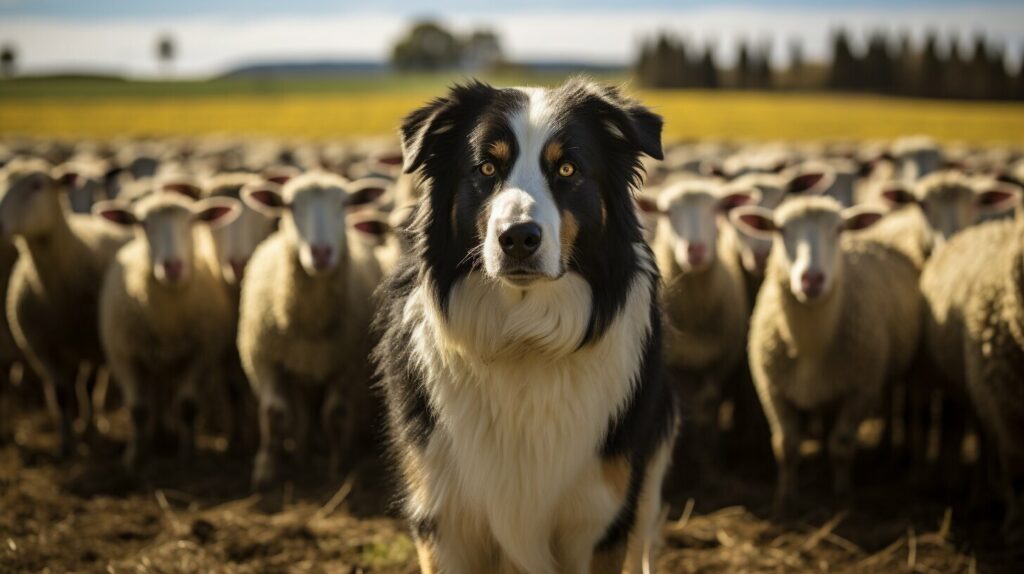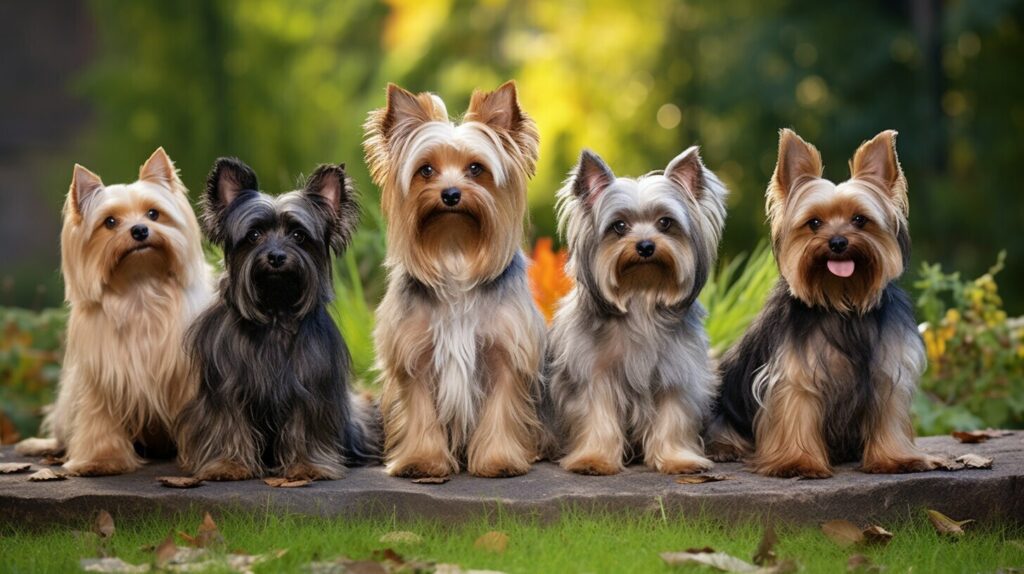Are you fascinated by the skills and intelligence of sheep dogs? These amazing working dogs have been a vital part of the farming industry for centuries, herding sheep and performing various tasks that have helped farmers manage their livestock. In this ultimate guide, we will delve into the history, breeds, training, and care of sheep dogs, as well as explore the role they play in modern agricultural practices and the challenges they face in competitive events such as sheepdog trials.
Key Takeaways:
- Sheep dogs have been bred specifically for herding and performing tasks on farms for centuries.
- There are various breeds of sheep dogs, each with unique characteristics and temperaments.
- Proper training and care are essential to ensure the optimal performance of sheep dogs.
- Sheepdog trials are highly competitive events that showcase the intelligence and abilities of sheep dogs.
Understanding the History of Sheep Dogs
Sheep dogs have a long and fascinating history dating back centuries. These working dogs were developed specifically for herding and have played an essential role in the agriculture industry. By understanding the history of sheep dogs, you can gain a deeper appreciation for these remarkable animals and their importance in modern farming practices.
The exact origin of sheep dogs is difficult to pinpoint, but it is believed they were first bred in Europe for herding purposes. As sheep farming became more popular in the 18th and 19th centuries, sheep dogs started to become more prevalent, and specific breeds were developed for this task. These working dogs became an integral part of farming life, assisting in the management of livestock and helping farmers maintain their livelihoods.
There are several sheepdog breeds, each with unique characteristics and temperaments. The Border Collie is the most popular sheepdog breed, known for its intense focus and herding instincts. Other popular breeds include the Australian Shepherd, Old English Sheepdog, and the German Shepherd, each bred for specific herding tasks and showing unique characteristics.
Understanding Sheep Dog Breeds
Sheep dogs were bred for specific jobs and tasks, and each breed has its unique characteristics. Here are some of the most popular working sheep dog breeds:
| Breed | Characteristics |
|---|---|
| Border Collie | Intelligent, highly trainable, intense focus, and herding instincts. |
| Australian Shepherd | Hardworking, agile, protective, and loyal. |
| Old English Sheepdog | Gentle, affectionate, protective, and loyal. |
| German Shepherd | Fearless, obedient, loyal, and protective. |
Understanding the history of sheep dogs and their breeds can help you appreciate these remarkable animals. Learning about their characteristics and temperament can also help you choose the right breed for your farm or herding needs.
Exploring Sheep Dog Breeds
Sheep dogs come in a variety of breeds, each with unique characteristics and temperaments that make them well-suited for the job of herding. Some of the most popular sheep dog breeds include:
| Breed Name | Description |
|---|---|
| Border Collie | Considered one of the most intelligent dog breeds, Border Collies are highly energetic and excel in herding and obedience competitions. They are often used for controlling flocks of sheep in both the United States and Great Britain. |
| Australian Shepherd | Originally bred in the United States for herding livestock, Australian Shepherds are highly intelligent, versatile, and energetic dogs. They are known for their ability to work for long hours in tough conditions, making them ideal for farm work. |
| Old English Sheepdog | This large breed of dog was originally bred for driving cattle and sheep to market. They are known for their shaggy coat and gentle demeanor, making them great family pets as well as farm animals. |
Other sheep dog breeds include the Shetland Sheepdog, Bearded Collie, and the Welsh Corgi. Each breed has its own unique set of characteristics that make them suited for herding tasks, and it’s important to understand these differences when selecting a sheep dog for your farm or ranch.
Herding Dogs: The Heart of the Farm
Sheep dogs, also known as herding dogs, are an essential part of farm life. Their ability to control and move livestock is vital to keeping a farm running smoothly and efficiently. Whether you are a small-scale farmer or a large rancher, a well-trained sheep dog can make the difference between a successful operation and a struggling one.
Training Tips for Sheep Dogs
Training sheep dogs is an essential aspect of their roles as working dogs. Proper training can enhance their herding instincts, intelligence, and obedience. Here are some valuable tips for sheepdog training:
- Start early: Begin training your sheep dog when they are young. They learn quickly at a young age and can retain their training for a long time.
- Use positive reinforcement: Use treats, toys, and praise to encourage your sheep dog during training. This method encourages good behavior and strengthens the bond between you and your dog.
- Focus on obedience: Basic obedience training is crucial for sheep dogs. They should be taught commands such as sit, stay, come, and heel. These commands aid in controlling the dog during herding and other tasks.
- Provide specialized herding training: Sheep dogs require specialized training to enhance their herding instincts. This training includes commands such as gather, flanking, and driving the flock.
- Train in various environments: Sheep dogs should be trained to herd in different environments such as open fields and enclosed spaces. This training ensures they can adapt to different situations.
- Challenge your dog: Sheep dogs are intelligent animals and require mental stimulation. Challenge them with new tasks and training techniques to keep their minds active.
- Train consistently: Consistency is key when training sheep dogs. Regular training sessions help them learn quickly and retain their training for longer periods.
- Be patient: Sheepdog training requires patience and perseverance. It can take time for dogs to learn new commands and behaviors. Consistent training and positive reinforcement can help your dog learn and excel in their herding role.
Conclusion
Training sheep dogs requires dedication, patience, and proper techniques. Basic obedience training, specialized herding training, and consistency are key elements to ensure your sheep dog is well trained. By following these tips, you can enhance your sheep dog’s abilities and make them great working dogs.
The Role of Sheep Dogs on Farms Today
Sheep dogs play an essential role on farms, especially those involved in sheep herding. Their natural herding instincts and intelligence make them invaluable for managing livestock. They assist farmers in various tasks, such as moving sheep from one area to another, separating them for shearing or veterinary care, and protecting them from predators.
Without sheep dogs, farmers would need to hire additional workers to perform these tasks, increasing labor costs and making farm management less efficient. Sheep dogs are also more effective than humans at herding livestock, as they instinctively understand the behavior of sheep and know how to move them efficiently.
Sheep dogs are especially crucial during lambing season, as they help farmers monitor and care for newborn lambs. They can also detect any issues that may arise during the birthing process, such as difficult births or medical complications, allowing farmers to act quickly to ensure the health and safety of their flock.
In addition to their practical uses, sheep dogs also provide companionship to farmers and their families. They often become an integral part of farm life, accompanying their owners on daily tasks and forming strong bonds with those around them.
In conclusion, sheep dogs are an indispensable part of modern farming practices. Their intelligence, herding instincts, and ability to assist in various tasks make them a valuable asset to farmers who raise sheep. With proper training and care, sheep dogs can provide a lifetime of service and companionship to their owners.
Unveiling Sheepdog Trials: The Ultimate Test of Skill
Sheepdog trials are highly competitive events that showcase the incredible intelligence and skills of sheep dogs. These competitions evaluate the ability of sheep dogs to herd sheep through a series of obstacles such as gates, fences, and pens.
The rules of the competition can vary depending on the event, but generally, sheep dogs are judged on their efficiency, speed, and control over the flock. Each dog must demonstrate their ability to round up and guide the sheep through the course without any physical contact. The handler must guide the dog through voice commands and whistle signals only, making the competition an impressive display of teamwork between the dog and its handler.
Challenges Faced
Sheepdog trials present several challenges to both the dog and the handler. The course often includes obstacles that can disorient the sheep, such as narrow passages, bridges, and steep slopes. The sheep may also try to separate or escape, making it challenging for the dog to maintain control.
Handlers also face challenges such as reading the sheep’s behavior and anticipating their movements. They must navigate the course while also keeping a close eye on their dog and the flock.
Scoring System
During the competition, judges evaluate the performance of each dog and assign points based on their performance. Points are awarded for the dog’s ability to control the flock, complete the course efficiently, and overcome any obstacles.
The highest-scoring dog is declared the winner, and the competition usually includes several rounds, with the top-scoring dogs advancing to the final rounds.
Sheepdog trials are not only entertaining but also provide valuable insights into the intelligence and capabilities of sheep dogs. These events showcase the unique bond between the dog and its handler and highlight the importance of proper training and care.
Understanding Sheepdog Intelligence
One of the most remarkable traits of sheep dogs is their exceptional intelligence. Their ability to learn, problem-solve, and make independent decisions is what sets them apart from other dog breeds. This intelligence is a crucial component of their herding instincts, allowing them to anticipate the movements of the flock and respond accordingly.
Studies have shown that sheep dogs possess a level of intelligence that is comparable to that of a young child. They are capable of understanding and responding to complex commands, and can even learn to differentiate between different objects and colors.
One of the reasons for their high intelligence is their breeding history. Sheep dogs were specifically bred for their herding abilities, so intelligence was a vital trait in selecting breeding pairs. This has resulted in a breed of dog that is highly attuned to their surroundings and able to adapt to changing situations quickly.
Another aspect of sheepdog intelligence is their ability to work independently. While they are trained to respond to commands from their handler, they also have the autonomy to make their own decisions in certain situations. This is particularly useful in situations where the handler may not be able to provide immediate direction.
In summary, sheepdog intelligence is a critical component of their success as herding dogs. Their exceptional learning capabilities, problem-solving skills, and independence allow them to perform their jobs with remarkable efficiency and precision.
Essential Care for Sheep Dogs
Proper care for sheep dogs is essential to maintain their physical and mental well-being, thereby ensuring optimal performance. Here are some tips to keep in mind.
| Grooming | Regular grooming is necessary to keep your sheep dog’s coat clean and healthy. Brush their fur at least once a week, paying special attention to their undercoat during shedding season. Trim their nails and clean their ears regularly to avoid infections. |
|---|---|
| Exercise | Sheep dogs are active breeds and require ample exercise to stay fit and healthy. Regular walks, jogs, and playtime will keep your dog happy and physically stimulated. |
| Nutrition | A balanced diet is crucial for your sheep dog’s overall well-being. Feed them high-quality dog food formulated for their breed and age, and ensure they have access to fresh water at all times. |
In addition to these key care practices, it is important to provide your sheep dog with a comfortable and safe living environment. Make sure they have access to shelter and shade, especially during extreme weather conditions. Provide them with toys and mental stimulation to prevent boredom, and seek veterinary care immediately if they appear unwell. By prioritizing these care practices, you can ensure your sheep dog remains healthy and performing at their best.
Key Characteristics of Sheep Dogs
Sheep dogs are the ultimate working dogs, with a range of unique characteristics and traits that make them stand out from other breeds. Here are some of the key characteristics that enable sheep dogs to excel in their herding roles:
- Instincts: Sheep dogs have an innate desire to work, with a natural instinct to herd and protect livestock. This instinct is shaped by their breeding and history, making them ideal for the job.
- Loyalty: Sheep dogs are fiercely loyal to their handlers, often forming strong bonds with the humans they work with. This loyalty enables them to follow commands and work tirelessly to get the job done.
- Agility: Sheep dogs are highly agile and able to move quickly and easily over rough terrain. This agility allows them to navigate the hills and valleys of farmland with ease, enhancing their ability to herd livestock.
- Intelligence: Sheep dogs are renowned for their intelligence and problem-solving abilities. They are able to make independent decisions and adapt their herding techniques to different situations, making them highly adaptable to changing conditions.
- Work ethic: Sheep dogs have an incredible work ethic, with a strong desire to please their handlers and get the job done. They are willing to work long hours and in all weather conditions, making them invaluable assets to farmers and ranchers.
These are just a few of the key characteristics that make sheep dogs so special. Their unique combination of instincts, loyalty, agility, intelligence, and work ethic make them the ultimate working dogs, and a valuable asset to any farm or ranch.
Conclusion
In conclusion, sheep dogs are an integral part of the farming industry and have been bred for centuries for their exceptional herding abilities. From their historical roots to their modern-day roles on farms, sheep dogs are a fascinating breed admired for their intelligence and loyalty.
This ultimate guide provided an overview of sheep dogs, including their various breeds, training tips, care requirements, and the challenges they face during sheepdog trials. You now have a deeper understanding and appreciation for these incredible working dogs.
As a farmer or someone interested in sheep dogs, it is essential to recognize their unique qualities and provide them with the necessary care and training they need to excel in their roles. By unleashing your knowledge on sheep dogs, you can cultivate a stronger bond with your loyal companions and enhance your knowledge of the farming industry.
Thank you for taking the time to explore this ultimate guide on sheep dogs. We hope it has provided you with valuable insights and encourages you to learn more about these remarkable animals.
FAQ
Q: What are sheep dogs?
A: Sheep dogs are specially trained working dogs that are bred and trained to assist in herding and managing sheep. They have a natural instinct and ability to work with sheep and are often used on farms for this purpose.
Q: What are some common sheep dog breeds?
A: Some common sheep dog breeds include Border Collies, Australian Shepherds, and Old English Sheepdogs. These breeds are known for their intelligence, agility, and herding abilities.
Q: How do you train a sheep dog?
A: Training a sheep dog involves a combination of basic obedience training and specialized herding training. It requires consistency, patience, and positive reinforcement to develop their herding instincts and skills.
Q: What is the role of sheep dogs on farms today?
A: Sheep dogs play a crucial role on farms by assisting in the herding and management of sheep. They help gather and move sheep, ensure their safety, and improve overall livestock management.
Q: What are sheepdog trials?
A: Sheepdog trials are highly competitive events that showcase the skills and abilities of sheep dogs. Handlers and their dogs navigate a series of challenges and obstacles designed to simulate real-life herding situations. The trials test the dog’s obedience, intelligence, and ability to work sheep.
Q: Are sheep dogs intelligent?
A: Yes, sheep dogs are known for their high levels of intelligence. They are capable of problem-solving, making independent decisions, and learning complex tasks. Their intelligence is a key factor in their success as herding dogs.
Q: What care do sheep dogs require?
A: Sheep dogs require regular grooming to maintain their coats, as well as daily exercise to keep them physically and mentally stimulated. They also require a balanced diet and routine veterinary care to ensure their overall health and well-being.
Q: What are the key characteristics of sheep dogs?
A: Sheep dogs have a strong herding instinct, exceptional loyalty to their handlers, agility, and intelligence. They are driven to work and excel in their herding roles, making them highly effective at managing and controlling sheep.



